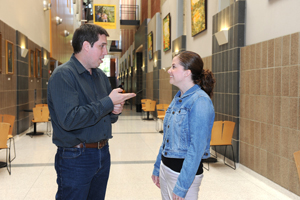
Helping Students Overcome Obstacles
Read Howard Tyler’s list of honors and it’s clear the animal science professor puts students first, based on awards for his work as a student adviser and mentor.
“I prioritize my time by focusing first on activities that have the most impact on students,” Tyler says. “Helping students overcome obstacles is the part of my job I find the most rewarding.”
Maggie DenBeste faced many obstacles. After high school, she enrolled at Kirkwood Community College. The following year, her parents divorced and her mother was diagnosed with terminal cancer.
Despite family turmoil, she graduated with an associate degree in agriculture and transferred to Iowa State. Her mother died the following spring. “I dropped half my courses and failed the other half,” DenBeste says.
She kept trying and in December 2002 graduated with a bachelor’s in animal science. In January, she learned she was pregnant and would be raising a son alone.
DenBeste worked four years before deciding she couldn’t make enough money to support herself and her son. She wanted to return to school and contacted her undergraduate adviser, Steven Lonergan, who introduced her to Tyler.
“Earning my undergraduate degree was difficult,” DenBeste says. “With my mother’s death, I had trouble caring. I got my grades up enough to graduate, but when I wanted to enroll in grad school, Dr. Tyler was the only one who would consider me.”
“Her grades were not stellar,” Tyler jokes. “But I didn’t feel her grades reflected her ability. It seemed with all she’d been through, graduate school would be a small challenge.”
DenBeste enrolled in January 2007. “That March I almost quit because I didn’t believe I could succeed. I stuck with it, thanks to Dr. Tyler and fellow graduate students,” she says.
Tyler deflects DenBeste’s praise, saying he “just encouraged her to talk, and tried to be supportive of her status as a single mom.”
DenBeste sees it differently. “I had a major lack of confidence,” she says. “During my project, I had to collect blood samples from baby calves within five minutes of birth. Dr. Tyler helped with the first few, watched for a few and then left me to sink or swim. He knew I could do it even if I didn’t.”
Tyler and his wife Kris helped on a personal level. “They would watch my son if I had to be at the dairy farm, or
working on my thesis, or just needed a night off,” DenBeste says.
Tyler organizes monthly meetings for his grad students. “We had speakers who would talk about their journey through life. Dr. Tyler wanted us to learn how to balance personal and work life,” DenBeste says.
She graduated in December 2009 with a master’s in animal physiology and is education program coordinator for the U.S. Pork Center of Excellence at Iowa State.
“Most students face obstacles, but often don’t know how to ask for help,” Tyler says. “Students typically don’t leave school because they aren’t smart enough. With a little more guidance, most could make it. Supporting students is a crucial part of my job.”
Faculty Resources for Helping Students Through Personal Challenges
Howard Tyler was among the first to sign up for the ISU Student Counseling Service’s new Mental Health First-Aid training. The 12-hour session teaches faculty and staff a set of action steps for helping a distressed student until appropriate treatment and support are received. “Many students just need someone to notice they are having challenges and ask about their life in a nonjudgmental way,” says Tyler, who completed the training in July. “The training gives you the tools to initiate these conversations, recognize the issues and effectively refer students to the appropriate resources,” he says.
“Most students face obstacles, but often don’t know how to ask for help. Students typically don’t leave school because they aren’t smart enough. With a little more guidance, most could make it. Supporting students is a crucial part of my job.”



